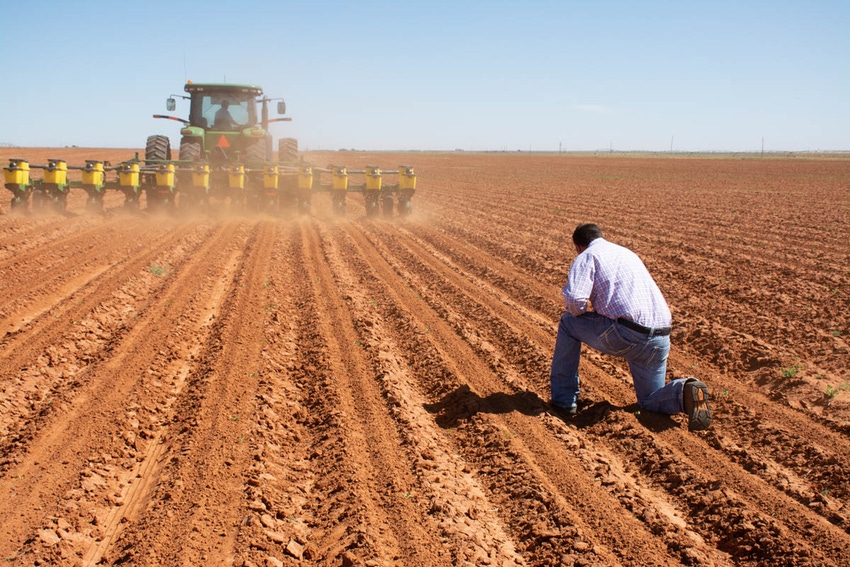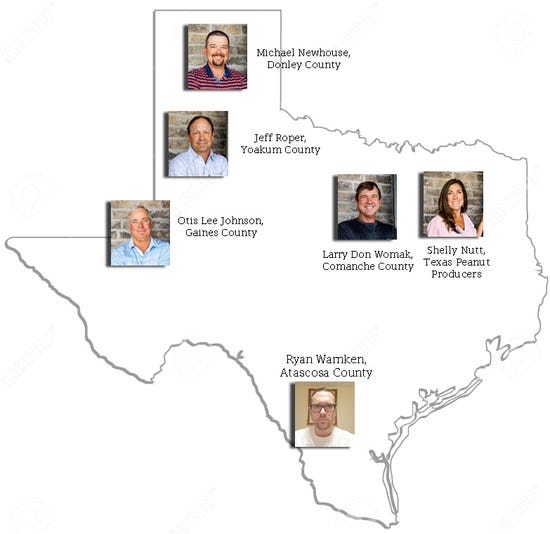
Texas peanut producers discussed strategies for success during a panel discussion during the 52nd meeting of the American Peanut Research and Education Society (APRES).
The virtual APRES conference, historically held in person, included panel participants face-timing during the "Production, Challenges and Strategies; a Grower Perspective," general session presentation.
The panel, moderated by Texas Peanut Producers (TPP) Executive Director Shelly Nutt, included five Texas producers:
Jeff Roper, TPP vice-chairman, Yoakum County, farms 2,200 acres, 450 acres of conventional and organic peanuts
Michael Newhouse, TPP board member, Donely County, grow peanuts, cotton, wheat, milo, and haygrazer and runs cattle
Otis Lee Johnson, TPP board member, Gaines County, farms 1,700 acres of cotton, 120 acres conventional and organic peanuts
Larry Don Womack, TPP board member, Comanche County, produces peanuts, sesame, wheat, oats, hay and mama cows, and owns Womack Nursery
Ryan Warnken, Atascosa County, farms about 1,200 acres, 500 acres of peanuts

The five producers cited drought, wind, declining water supplies, equipment and breakdowns and low prices as significant challenges. They also noted strategies for success.
"The most we can do is manage our resources as best as we can, deciding what we can water and what's going to make the best crop and most money this year," Johnson said, noting drought and heat as his biggest hurdles.
In a climate of low commodity prices, Johnson also stressed the importance of working with a marketing consultant. "We're just doing the best we can to manage our resources and market our crop," he said.
Roper's strategy includes contracts. "I've got all my peanuts contracted, thank the Lord, but the debt is getting closer every year because of the lack of rain."
Newhouse, who farms in a region on track to be the windiest year on record, has altered the time of day he sprays.
"It's been too windy or too hot during the daytime," he said. "In the mornings, by the time you get the sprayer loaded, it's 7:30, and the wind's already howling. By the time you get moved to the field, you can't get anything done. So, we've been spraying a lot at night, trying to get caught up. We're about there."
Warnken likened his strategy to a game of whac-a-mole. "Whenever something pops up, we jump on it as quick as we can. We fix it and fix it right, so it doesn't bite us the next week," he said. "We try not to get behind. It's just one day at a time, one problem at a time."
Faith
Faith plays a central role in these growers' resolutions to 2020's challenges. Newhouse listed prayer as his top strategy.
"We pray a lot for our health and our country," Newhouse said. "Recently, we've been blessed with a little bit of rain. Part of our farms had some rain west of town last night (July 13). We had about half to eight-tenths of an inch. My other farms east of Clarendon had about two-tenths. Every bit counts."
But faith in the human race also is important. "Used to if something broke, it wasn't such a challenge to get it fixed," Newhouse said. "Now, there are so many electronics -- sensors backing up sensors-- if something breaks down, it's a nightmare. You worry about how much it's going to cost and if they can't get here for a week, what do you do? So, it takes a tremendous amount of faith in above and in mankind, too."
Roper, who's been farming "for a long time," said he's weathered four consecutive droughts, "1998 and 1999, and 2011 and 2012, so I'm scared about next year," he somewhat joked. "You have to have faith you can get through it and have good backing with your banker. I've got a good relationship with my lender -- he's the only reason I'm still farming."
Patience and openness to new ideas topped Womack's list. "Every day is a new headline. In my operation, diversification helps with that. And like Michael said, maybe it's faith or the hardheadedness of being a farmer, but we stay out there and stay with it. It's one day at a time," he said. "We live in the best place we could ever live, especially in what we're going through."
"As a farmer, you've got to have faith and know that somehow, it's going to work out," Newhouse said. "You've got to make decisions, stick with those decisions, and see how it plays out."
To read more about the challenges discussed by the panel, click here.
Read more about:
DroughtAbout the Author(s)
You May Also Like






